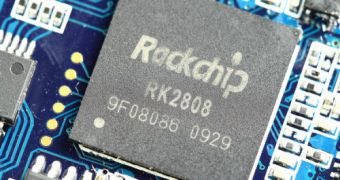One of the hottest topics in browser-related news these days is the fact that Google will only support the open-source WebM video format and VP8 video codec, dropping H.264 altogether, but it seems that Rockchip, whose processors power most Chinese tablets and MIDs, is ready for this move. And that's because their new RK29xx generation mobile Internet platform, recently released at CES 2011, is touted as being the world's first system-on-a-chip (SOC) to support 1080P HD decoding of the VP8 video codec completely at hardware level.
As previously reported, this solution, targeting specifically mobile Internet applications, incorporates an ARM Cortex-A8 CPU and the NEON SIMD engine to improve software media processing capability.
The A8 core can enable up to 1.2GHz frequencies, while the RK29xx also sports a dedicated Full HD decoding and encoding processor, hardware accelerated Adobe Flash Player 10.1, 3D/2D GPUs and also Android 2.3 (Gingerbread).
"Cooperating with WebM has brought the benefit of Rockchip's years of experience in the audio and video fields," said Chen Feng, Vice Present of Rockchip, adding that "the successful support of VP8 marks China's semiconductor industry becoming international and Rockchip is devoted to continued support."
"We're very excited that Rockchip chose our G-Series 1 hardware design to add VP8 support to the RK29xx," said Jani Huoponen, Hardware Product Manager for the WebM project.
"Playback of HD content in hardware is very important to the WebM project and we look forward to seeing deployment of devices powered by the RK29xx," the WebM project representative continued.
Of course, what remains to be seen right now is just how well the products built on the Rockchip RK29xx platform will behave in real-life conditions, but given the rate at which new tablets make an appearance on the Chinese market, we're pretty sure that we won't have to wait for too long.

 14 DAY TRIAL //
14 DAY TRIAL //